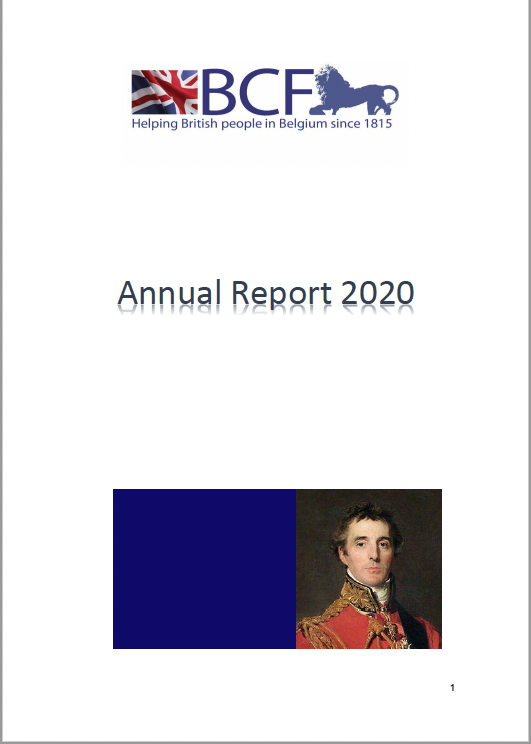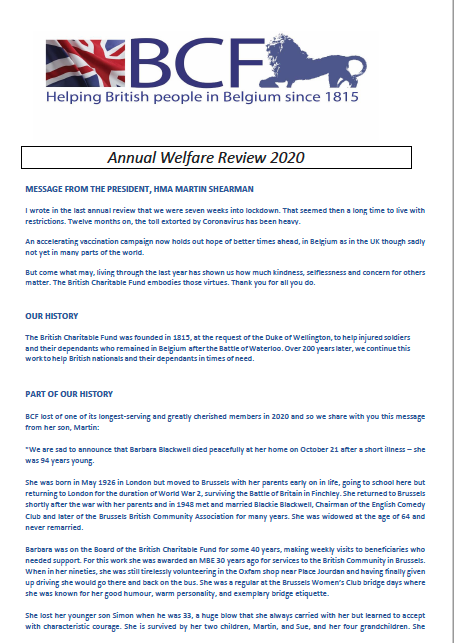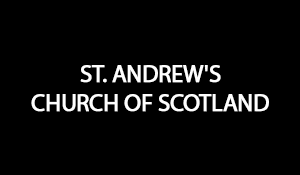
Who We Are
The BCF is a not-for-profit organisation – an asbl – but, more importantly, is currently the only registered charity providing for the needs of the British community in Belgium. We are immensely proud to be have been accorded the Royal Patronage of His Majesty King Philippe of the Belgians and the we enjoy the full support of the Duke of Wellington.
What we do
We try to help anyone with a genuine need of advice, conversation or material assistance.
Apart from the requirements in our statutes that beneficiaries be British or a dependant (including widows or widowers) and in Belgium, there are no rules, except that in practice applicants should have exhausted the normal means of support from family and state agencies. BCF is willing to look at any case with due care and attention, but will be strict in its assessment. Our resources are limited. When we give temporary financial loans, if it is possible, we should like to be repaid so that we an continue to help others in the future.
How we do it
We have an extensive set of contacts in Belgium, both from within the BCF itself and from other organisations.
Applicants contact us either directly or are referred to us through our associated organisations. To save time and to be able to react quickly, a small group (the Chairman, Secretary and Treasurer) assesses immediately whether we can and exactly what can be done to help. A Fund member will visit or contact the applicant and try to assist. Volunteer members of the Fund are long term expatriates who will be able to direct applicants to assistance if they cannot provide it personally. The assistance that the BCF provides is completely confidential – names and details of help offered are not disclosed beyond the BCF. BCF members give their time and assistance for free – as can be seen from the Annual Reports (shown below) expenses are kept to the absolute minimum.
How we pay for it
Purely by donations and legacies.
We rely on the support of individuals, associations, clubs, schools and churches. We receive no government subsidies, grants or other income – depending entirely upon the generosity of the British and English-speaking community. In nine of the last ten years, our help given to applicants has exceeded the income that we have received. We have been kept afloat by profits on investments and by two generous legacies. Given the current global financial climate, neither of the these sources can be relied upon for income in the future.
To make a single payment donation or standing order.
Every donation of Euro 40 or more is deductible for tax, as authorised by the Belgian Ministry of Finance. At current tax rates this means that any gift to the Fund only costs the donor half of the total amount. Similar concessions are uniquely available to BCF for gifts given within the context of a will – see LEGACIES below.
Whom do we help?
The British Charitable Fund was created in 1815 to provide help for British soldiers and for their dependants who were left behind in Belgium after the Battle of Waterloo. In the 21st century, this remains our core mission but the remit has been broadened to include anyone and everyone in Belgium with a British connection. We help young and old, long term residents or short term visitors – rich and poor alike. The BCF is non-denominational – and non-judgmental. A telephone call or a mail is all that is needed to see whether we might be able to help. Confidentiality is guaranteed.
Why we do it
Quite simply, because there is a need.
Even today, despite the best efforts of many agencies, there are gaps in the provision of social help that can uniquely affect foreigners in Belgium. Health care and social benefits are not interchangeable with those of the UK. There are requirements of registration, waiting periods for entitlements and no automatic right of residence. Contrary to popular belief, whilst EU membership used to guarantee a right to work in a Member State, today, those who cannot find work can be deported. Even longer term residents can fall foul of pension legislation, need help with inheritance provisions that are vastly different from those of the UK or need help in providing for old age. Younger people may have temporary educational or emotional problems, or simply homesickness or difficulties in adapting to life in Belgium. We know that all of these temporary problems can be made worse by language difficulties, and often the awkwardness of coping in the absence of a spouse or parents. Belgium operates an effective “safety net” for severe cases, but it can be helpful, to say the least, to have assistance in navigating towards the opportunities.

Our History
The BCF was founded by the Duke of Wellington immediately after the Battle of Waterloo in 1815.
It was administered by the Duke of Richmond and its original intention was to help provide for dependants of soldiers killed in the battle , their families and camp followers who were left stranded in Belgium. For more than two hundred years the Fund has continued to help Britons and their dependants in an astonishingly wide series of circumstances ranging from helping injured soldiers to return to their home country to aiding women lured to Brussels during the last century to become “governesses”, escape a worse fate, to battling bureaucracy for persons threatened with deportation.
In 1853, BCF records show numerous references to Florival (Cotton Mill) from which the Committee were frequently assisting young women, mostly Irish, who called for relief or even repatriation.
In September 1870, large numbers of British families resident in France fled before the Prussian invaders and, arriving in Brussels, turned to the BCF for assistance.
The Fund has supplied everything from help to repatriate, to deliveries of coal to the poor, to simple advice and comfort. The types of needs have changed over the centuries, but human nature and its capacity for getting into difficulties apparently have not!
Success Stories
In these stories the names have been changed to protect the identify of those we help. Confidentiality is always respected by the BCF volunteers.
Harry
Harry, 86, who lived in London, lost his wife a couple of years ago and had been ill. His daughter, Mary, living here in Belgium, decided to “relocate” Harry and he moved over here in August last year. Just before New Year he fell ill and was diagnosed with bowel cancer. He was operated on and has received the all-clear. BCF were put in contact with Mary and Harry and one of our volunteers has been visiting him regularly since October last year. Now that Harry is well enough he visits the Wednesday Club on a regular basis and these visits have enhanced his quality of life immensely.
John
Another of our volunteers reported that on visiting John he had found him in a very depressed state. His wife had left him, would not give him a divorce, and was still returning bills to him for expenses on the house which was owned by her and from which he had been forced to leave. John was incapable of dealing with his own affairs. Through local and national contacts BCF was able to provide financial and legal advice and assistance, and eventually medical help was arranged by friends. He is still visited by BCF volunteers.
James
A volunteer with BCF reported that he had received a call from a lady living north of Brussels. There was a possibility that her father in-law might have had to go into a home and she asked if the Fund knew of any homes that catered for English speakers. This is a common request and we were able to help.
Marie-Paule
Marie-Paule's husband served in the British Army during World War 2 until being eventually invalided out in 1946 of an illness that ultimately caused his death three years ago. His widow wrote twice to the UK authorities to inform them but his war pension continued to arrive. She assumed it had reverted to her but then received notices and threats from the UK to repay all sums she had received - her bank in Brussels was requested to seize the money immediately. BCF intervened to explain the circumstances and avoid repayment of sums she could not afford and has since continued to provide social visits and support.
Joanna
Joanna had come to Belgium with her British husband and had a daughter. Her husband physically abused her and she eventually obtained a divorce. He then failed to provide in any way for the daughter and in the absence of a substantial income - difficult for a single mother with a young child - Joanna is currently threatened with not being able to obtain a residence permit and thus faces deportation. Her husband has been sentenced to prison and so has disappeared. BCF is providing financial help and defending the rights of Joanna to seek redress and remain in Belgium.
Peter
Peter is an English man who has lived on the streets of Brussels for many years. Every now and again, he will contact the BCF and make a request for something that will make his life a little more comfortable. On one occasion, he asked if we could provide him with a sleeping bag. On another, he asked for a new pair of robust shoes. We are always happy to help Peter.

Reports
BCF publishes an Annual Report which details its activities over the past year and its financial results.
The Report contains messages from the President and Chairman, detailed financial accounts as required by law, the names of committee, members, officials and donors. By tradition the Annual General Meeting is held at the British Embassy in Brussels and presided by the British Ambassador.
Extracts from the several previous Annual Reports can be accessed below.
Full copies can be obtained from the Secretary, Jonathan Falck, at bcfbelgium@gmail.com.
Related Organisations
The Club, located in Braine-l'Alleud, just south of Brussels Belgium, provides a caring and secure environment within which members can enjoy each other's company
Community Help Service is a non-profit organisation established in 1969. It provides information, support and mental health services to anyone in Belgium who needs help and prefers to speak English. CHS is committed to offering assistance, support and mental health information to the community at large regardless of nationality and taking into account individual financial circumstances.
Holy Trinity Brussels is an English-speaking Anglican church bringing together people from over 40 different nations. We are a church of tremendous diversity, with people from many language groups, races, and social backgrounds. We include single people, families, refugees, ex-pats, and long-established citizens of our host country. For all those who come to us, we aim to offer a place to belong and a spiritual home.
All Saints’ Episcopal Church is a welcoming and dynamic church, home to Anglican Eucharistic worship since 1979. The only Episcopal parish in Belgium, we are linked to other Anglican churches in Belgium as fellow members of the worldwide Anglican Communion, and to other American parishes in Western Europe as a member parish of the Convocation of Episcopal Churches in Europe.
The ABCA was founded in 1920 and now exists to promote English language and cultural contact between all nationalities. It provides an opportunity for social contact which people, living mainly in the Greater Antwerp area, might want or need.
St. Andrew’s Church of Scotland is an international and diverse Presbyterian church in Brussels, Belgium. We aspire to follow Jesus in bringing the knowledge of God’s love to all.
The Brussels Branch helps ex-servicemen or women who are in need of varying levels of support. This includes hospital and home visits as well as financial assistance. It also provides a social focus for members which includes trips, lunches and various other activities.
The British Consulate-General offers help which is appropriate to the individual circumstances of each case. Find out what they can do for you.
The horrific terrorist attacks of 22nd March 2016 in Brussels sadly claimed many lives and injured many others. British nationals were amongst the dead and injured, and the BCF has provided, and will continue to provide, much-needed help to both victims and families. V-Europe continues to do a magnificent job for the victims and has our full support.
The Brussels British Community Association (BBCA) is a focal point for the British community in the Brussels area, open to organisational and individual membership.















